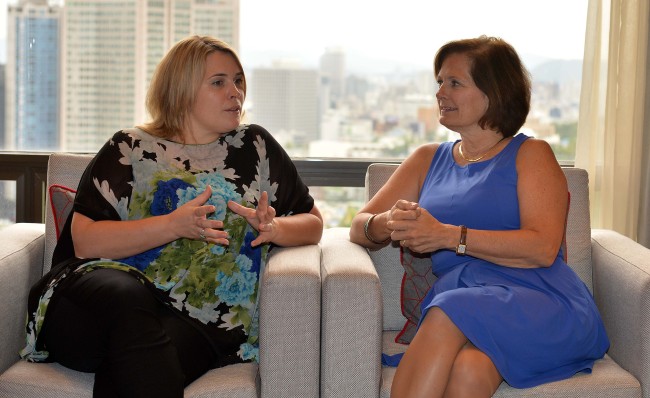최근 세계적으로 큰 반향을 불러일으킨 “강남스타일”의 주인공 싸이를 선두로 한 케이팝은 미국과 유럽 시장을 공략하기 시작했다.
“제 세 살짜리 조카도 강남스타일 춤을 출 줄 압니다.” 풋잇아웃데어 픽쳐스(Put It Out There Pictures)의 프로듀서이자 임원인 머피 포터는 “강남스타일”과 같이 호주에까지 영향을 주었던 한국 음악은 없었다고 말했다.
아메리칸 퍼블릭 텔레비전 (American Public Television) CEO인 신시아 페네맨은 미국에서 한국 음악의 급속한 성장을 언급했다. 그녀는 “아시아계가 아닌 사람들이 케이팝에 열광하는 범위가 대단하다. 굉장한 일이다”라고 말했다.
하지만 두 명 모두 케이팝과 달리 한국 드라마는 여전히 미국과 호주 안의 소수의 시청자층만을 가지고 있는 점을 지적했다.
페네맨은 “한국드라마 방송시간의 차이점에 의한 것 같다”라고 말했다.
그녀에 따르면 미국 텔레비전 쇼는 42분에서 50분 정도 지속되는 반면에 한국 드라마는 평균적으로 60분에서 70분 정도이다.
포터는 언어의 차이를 들었다. 더빙된 드라마를 많이 보는 다른 나라의 경우는 괜찮을지도 모르지만, 공통언어를 가지고 있지 않은 나라들의 경우 언어가 한국 드라마의 확산을 막을 것이라는 설명이다.
그들은 이미 한국 드라마 콘텐츠를 접한 적이 있고 제 8회 서울 국제 드라마 어워즈에 참여했다.
“이 시상식은 몇 안 되는 드라마를 조명하는 시상식"이라며 페네맨은 서울 국제 드라마 어워즈에 대해서 “당연히 이 시상식이 국제무대라는 것은 너무나도 중요하다”라고 밝혔다.
올해 25개의 후보작 중에 다섯 개는 한국작품이며 SBS의 스릴러 “추적자”는 8회 서울 드라마 어워즈에서 최고 작품부문에서 2등의 영광을 안고 갔다.
포터는 “정말 감동적인 쇼”라고 감탄했고 “정말로 환상적인 연기였다”라고 했다.
그러나 한국드라마의 높은 수준에도 불구하고 아시아 시장을 벗어난 곳에선 눈에 띌만한 주목을 받지 못하는 것이 문제다.
물론 희망은 있다. 포터는 공동제작이야 말로 한국드라마의 해외 진출의 좋은 방법이라고 밝혔다. 그녀는 “전세계의 시청자들은 점점 콘텐츠를 굶주려 한다. 공동제작이 장려되어야 한다”라고 말했다.
(영문: 오지은 코리아헤럴드 기자 / 한글: 성진우 인턴기자)
<관련영문기사>
Can K-dramas take off outside Asia?
 |
Put It Out There Pictures company director Muffy Potter (left) and American Public Television CEO Cynthia Fenneman discuss K-dramas in Seoul on Thursday. (Lee sang-sub/The Korea Herald) |
In the past few years, K-pop has tapped the hitherto impenetrable European and American markets with acts like Super Junior and Psy, whose single “Gangnam Style” became a chart-topping, universally hot phenomenon.
“My 3-year-old nephew can do the dance,” said Muffy Potter, who is company director and producer of Put It Out There Pictures, noting that “Gangnam Style” had definitely reached Australia.
American Public Television CEO Cynthia Fenneman, noted a similar development in the U.S. “It was quite the rage amongst non-Asians to admire K-pop. It was quite a cool thing,” said Fenneman who heads a major U.S. programming distributor.
However, the same could not be said about K-dramas, which both Potter and Fenneman agree are still primarily viewed by a limited, specific audience in America and Australia.
“I think the trick is because Korean dramas are of a different length,” Fenneman a onetime executive producer for PBS’ “Ciao Italia,” said.
According to Fenneman, U.S. television shows run for 42 to 50 minutes while Korean dramas average an hour to 70 minutes.
“That would mean editing content,” said Fenneman.
“The other thing is language,” said Potter, an Australian producer who co-helms a production company.
Potter noted that while language would not be an issue in countries where dubbed content is prevalent, selling content to countries that do not share a common language “is probably the biggest obstacle” to the further spread of K-dramas.
Both industry experts are acquainted with K-drama content and were in Korea for the 8th Seoul International Drama Awards last week.
Fenneman, who was a juror for last year’s Seoul International Drama Awards, acted as a consultant for the event while Potter served as a juror this year.
“This is one of the few arenas to really put drama up on a pedestal,” Fenneman said of the Seoul International Drama Awards. “Of course, that it is international is so important.”
According to Fenneman, the event is “really putting Korean dramas on the map.”
This year, five out of a total of 25 nominated works were Korean and SBS’ thriller “Chaser” walked away with secondary honors for Best Series at the awards ceremony.
“That was such a moving show,” said Potter. “It really was; absolutely fantastic performances in it.”
Yet despite the quality of K-dramas, the K-drama as a genre has yet to gain notable momentum outside the Asian market.
Remakes, which eliminate the language barrier issue, would seem like the most logical way to expand the overseas market for K-drama. However, according to Potter, the battle to get formats sold and distributed outside of one’s country is cutthroat.
“It is an incredibly competitive marketplace right now,” said Potter.
That does not mean there is little hope for K-dramas in the broader television market. The market is ripe for dramas, says Potter, with co-production a way to expand K-dramas’ reach abroad.
“I think there is a resurgence in television dramas,” said Potter. “I think television drama is the new cinema.”
Potter also noted that “audiences across the globe are more hungry for content. It is encouraging more co-productions.”
 |
The 8th Seoul International Drama Awards ceremony held at the National Theater of Korea on Thursday (Seoul Drama Awards Organizing committee) |
Potter went on to reference one of this year’s standout global collaborations, “Top of the Lake.”
The miniseries was co-directed by prominent filmmaker Jane Campion and co-produced by UKTV in Australia and New Zealand, U.K.-based BBC Two and the U.S.-based Sundance Channel.
For Potter, the success of a collaborative effort like “Top of the Lake” hinged on its “great storytelling.”
Potter, who is taking part in a Broadcast Worldwide 2013 drama workshop for global marketing strategies in Korea this week, said those looking to take K-dramas farther afield might begin with, “What kind of stories can we tell that may be set in Korea that could reverberate across the world?”
“That’s how you start selling ideas and formats,” Potter said.
Large-scale global collaborations seem to already be happening in the Korean film industry, most notably with the much-talked-about Bong Joon-ho-helmed flick, “Snowpiercer.”
Primarily a Korean production, The Weinstein Company is acting as the film’s distributor for America and several other countries while the cast includes high profile British and American actors and actresses.
Given that the film is in English, it will be interesting to see how English-speaking countries receive the film when released there.
Should “Snowpiercer” garner a positive reception abroad, it might bring up several questions for the Korean entertainment industry, including the drama market, which seems to have yet to see notable success in overseas collaborations.
By Jean Oh
(
oh_jean@heraldcorp.com)







![[Exclusive] Hyundai Mobis eyes closer ties with BYD](http://res.heraldm.com/phpwas/restmb_idxmake.php?idx=644&simg=/content/image/2024/11/25/20241125050044_0.jpg)
![[Herald Interview] 'Trump will use tariffs as first line of defense for American manufacturing'](http://res.heraldm.com/phpwas/restmb_idxmake.php?idx=644&simg=/content/image/2024/11/26/20241126050017_0.jpg)
![[Herald Review] 'Gangnam B-Side' combines social realism with masterful suspense, performance](http://res.heraldm.com/phpwas/restmb_idxmake.php?idx=644&simg=/content/image/2024/11/25/20241125050072_0.jpg)